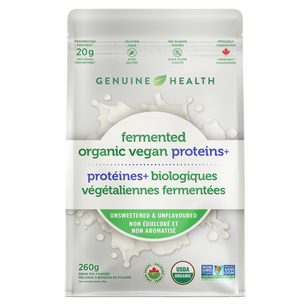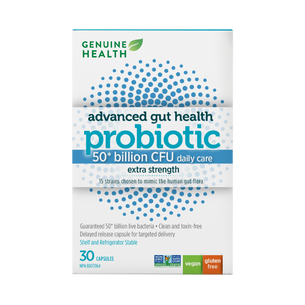Your Skin Woes May Be Linked to Your Gut

Skin breakouts, rashes like eczema or psoriasis… even rosacea. Aside from a bummer, what do all these skin conditions have in common? If you guessed your gut, you’re right.
Your skin is a mirror of what is going on with the rest of your body – especially your gut. You can eat well, hydrate properly, and get good sleep, but if the inner world of your gut isn’t happy, it will show up on the outer world that is your skin (1).
Because your skin, which provides a container for the rest of your body, is the most visible organ to the outside world, it makes sense that it would be the first organ to show signs that something isn’t right.
But why is this?
Your skin lines not only the outside of your body, but your entire digestive tract. If you think about it, your skin and your digestive system are the only two body systems that touch the outside world. Your skin acts as a barrier to the outside world and has the important job of protecting the inside of the body from infectious organisms.
Your gut is where your body makes sense of the food that you put in it – each day you put food into your body and your gut must break it down into nutrients that get absorbed into the bloodstream. Nutrients like zinc, Vitamins A, C, and E, and omega-3 fatty acids – which are essential for beautiful skin – get absorbed in the gut. Your GI system also protects your organs and deeper body systems from being exposed to infectious organisms. The second function of the gut is to eliminate waste. Toxins must get eliminated; if they are not being eliminated through the GI system, they will be pushed out through the skin.
Crohn’s Disease and ulcerative colitis are two types of inflammatory bowel disease, characterised by chronic inflammation along the walls of the small and/or large intestine. Interestingly up to 40% of Crohn’s and colitis sufferers have manifestations that show up outside of their bowels – most often their skin (2)!
Here are some other links between skin and the gut.
In the 1930s, long before these discoveries were made, two dermatologists named Dr. John Stokes and Dr. Donald Pillsbury found a link between gut inflammation and acne. You know what they prescribed? Fish oils and probiotics.
This seems like a sensible approach: extinguish the inflammation in the gut to heal the acne.
But if you think about many of the conventional skin treatments today, they are usually only topical and don’t treat the root cause of the problem. Dotting spot treatments on pimples and obliterating bacteria on your face with an antibacterial wipe will do little to solve a problem that started in the gut. Ditto with applying a cortisone cream to a patch of eczema. These are only temporary fixes – if the problem started in the gut, it’s got to be fixed in the gut!
It’s time to think about what’s happening in the inner world of your body and find the root cause of your skin woes.
When there’s trouble brewing in the gut, the skin will most always be the first place to show. In the 1980s, Dr. Bernard Jenson noticed the direct link between the gut and overall health at his California sanitorium. By cleansing and healing the gut, Dr. Jensen saw his patients’ skin conditions completely reverse.
Many skin conditions that start in the gut can be traced back to altered gut flora:
Coined by Dr. Eli Metchnikoff in the early 20th century, dysbiosis roughly translates to ‘life in distress’ – you and your bacteria are not living together in mutual harmony! This happens when there is either too little good bacteria or too much bad. Good bacteria can provide protective effects – especially when it comes to acne – Bifidobacteria, a type of bacterial family that is found in your microbiome (and in probiotics) have been found to provide antimicrobial effects. Three strains of bifidobacteria have been found to reduce the viability of p. acnes, a strain of bacteria responsible for acne vulgaris (3).
SIBO, which means ‘small intestinal bacterial overgrowth’ is a condition where too much gut bacteria happens to reside in the wrong place – your small intestine! SIBO can cause symptoms like bloating, gas and discomfort. On the skin, SIBO has been found to manifest as rosacea.
Leaky gut is a condition where the gut lining becomes permeable, allowing material to pass from your gut into your bloodstream. One of the roles of the gut is to keep foreign material out of the bloodstream – this is why leaky gut can cause so many problems. When infectious or foreign materials end up in the bloodstream, the immune system mounts a response that can lead to inflammation and auto-immune diseases. Normally, the bacteria that live in your gut form a protective coating over the inside of your gut, helping to maintain the integrity of the lining, but when these bacteria are wiped out, the gut lining becomes more vulnerable to invaders.
Dysbiosis, SIBO and leaky gut are all issues with altered microflora, and benefit from a super potent probiotic. As Forest Gump famously said, “Life is like a box of chocolates, you never know what you’re gonna get.” The same can be said of some of the probiotics available today, with some products not living up to the promise that they make on the label.
Your gut should be home to a rich ecosystem of species, and using a potent probiotic can quickly help to repopulate the garden that is your gut. Our advanced gut health probiotic is a super-potent, multi-strain formula that delivers up to ten times more bacteria.
Some probiotics only provide a few strains, but advanced gut health probiotic is crafted with 15 strains that mimic healthy human gut flora. Each strain provides a different benefit to your body, and together the different strains work to provide overall balance to your microbiome. One thing that no one mentions is that antibiotic use wipes out certain strains of bacteria, resulting in a bigger die-off of the other strains that were dependent on them. The friendly bacteria in advanced gut health probiotic don’t simply add 15 bacterium to the GI tract for a short period, they allow other bacteria who are dependent on them to grow and flourish, having a greater exponential effect. In 75% of the cases where studies evaluated multi-strain formulas versus individual species, the multi-strain formula was more effective.
A controlled process ensures that the probiotics contained in advanced gut health probiotic are the strongest and fittest living organisms. The strains are first cleaned, and then enclosed in a vegan, plastic-free, delayed-release capsule with a fermented prebiotic – this ensures that the strongest organisms get to the gut where they thrive. Research shows that advanced gut health probiotic can deliver up to ten times the probiotics to your gut, compared to other products on the market.
BUT – maximizing the benefits of probiotic supplementation requires a complete approach to digestive health.
A supplement regimen that PRIMES, SEEDS and FEEDS your gut, provides the gut bacteria the complete support it needs to establish healthy populations in the large intestine.
PRIME: Fermentation acts like a fertilizer for your gut. By priming the gut you prepare it to sustain friendly bacteria and to receive nutrition. fermented vegan proteins+ and fermented Greek yogurt proteins+, have been fermented for optimum absorption, digestion and nourishment
SEED: advanced gut health probiotic helps to SEED the gut with the optimum variety and balance of healthy bacteria, with a unique capsule that delivers up to 10x the healthy bacteria to your gut.
FEED: Just like taking quality probiotics, it’s equally important to find a quality prebiotic. Based on cutting-edge research, fermented organic gut superfoods+ nourishesas the ultimate prebiotic superfood that amplifies the benefits of your probiotic.
In the 1930s, those same two dermatologists who prescribed probiotics and fish oils to treat acne made a connection between the gut, skin and brain. They linked depression, anxiety and skin conditions like acne by hypothesizing that certain emotional states like stress can alter the gut microflora and contribute to inflammation in the body, leading to skin conditions and changes in mood (4).
This perfectly illustrates the way that the body works. Not as one system, but as a series of systems that work together. It’s often said that the body is a verb (process), not a noun (a thing).
Don’t spot-treat. Treat your body as a system, starting with the gut, and watch the healing unfold… often in places that you didn’t believe were connected.
Sources:
Ali IA, Foolad N and Sivamani RK. Considering the Gut-Skin Axis for Dermatological Diseases. Austin J Dermatolog. 2014;1(5): 1024. http://austinpublishinggroup.com/dermatology/fulltext/ajd-v1-id1024.php
Rothfuss KS, Stange EF, Herrlinger KR. Extraintestinal manifestations and complications in inflammatory bowel diseases. World J Gastroenterol. 2006 Aug 14;12(30):4819-31. https://www.ncbi.nlm.nih.gov/pubmed/16937463
Lee DK, Kim MJ, Ham JW, An HM, Cha MK, Lee SW, et al. In vitro evaluation of antibacterial activities and anti-inflammatory effects of Bifidobacterium spp. addressing acne vulgaris. Arch Pharm Res. 2012; 35: 1065-1071. https://www.ncbi.nlm.nih.gov/pubmed/22870816
Whitney P Bowe and Alan C Logan. Acne vulgaris, probiotics and the gut-brain-skin axis - back to the future? Gut Pathog 2011; 3: 1. https://www.ncbi.nlm.nih.gov/pmc/articles/PMC3038963/
Your skin is a mirror of what is going on with the rest of your body – especially your gut. You can eat well, hydrate properly, and get good sleep, but if the inner world of your gut isn’t happy, it will show up on the outer world that is your skin (1).
Because your skin, which provides a container for the rest of your body, is the most visible organ to the outside world, it makes sense that it would be the first organ to show signs that something isn’t right.
But why is this?
Your skin lines not only the outside of your body, but your entire digestive tract. If you think about it, your skin and your digestive system are the only two body systems that touch the outside world. Your skin acts as a barrier to the outside world and has the important job of protecting the inside of the body from infectious organisms.
Your gut is where your body makes sense of the food that you put in it – each day you put food into your body and your gut must break it down into nutrients that get absorbed into the bloodstream. Nutrients like zinc, Vitamins A, C, and E, and omega-3 fatty acids – which are essential for beautiful skin – get absorbed in the gut. Your GI system also protects your organs and deeper body systems from being exposed to infectious organisms. The second function of the gut is to eliminate waste. Toxins must get eliminated; if they are not being eliminated through the GI system, they will be pushed out through the skin.
Scientific Links Between Skin and the Gut
Crohn’s Disease and ulcerative colitis are two types of inflammatory bowel disease, characterised by chronic inflammation along the walls of the small and/or large intestine. Interestingly up to 40% of Crohn’s and colitis sufferers have manifestations that show up outside of their bowels – most often their skin (2)!
Here are some other links between skin and the gut.
- Acne sufferers are more likely to suffer from impaired gut microflora and leaky gut
- Atopic dermatitis (also known as eczema) and psoriasis, are two skin conditions with autoimmune links that can be traced to altered gut microflora and leaky gut
- Rosacea has been linked to small intestinal bacterial overgrowth (SIBO)
- Celiac Disease, which is an auto-immune condition where gluten, the protein found in wheat, causes damage to the small intestine and inhibits the absorption of nutrients, can cause a skin rash called dermatitis herpetiformis
In the 1930s, long before these discoveries were made, two dermatologists named Dr. John Stokes and Dr. Donald Pillsbury found a link between gut inflammation and acne. You know what they prescribed? Fish oils and probiotics.
This seems like a sensible approach: extinguish the inflammation in the gut to heal the acne.
But if you think about many of the conventional skin treatments today, they are usually only topical and don’t treat the root cause of the problem. Dotting spot treatments on pimples and obliterating bacteria on your face with an antibacterial wipe will do little to solve a problem that started in the gut. Ditto with applying a cortisone cream to a patch of eczema. These are only temporary fixes – if the problem started in the gut, it’s got to be fixed in the gut!
It’s time to think about what’s happening in the inner world of your body and find the root cause of your skin woes.
Finding the Root Cause
When there’s trouble brewing in the gut, the skin will most always be the first place to show. In the 1980s, Dr. Bernard Jenson noticed the direct link between the gut and overall health at his California sanitorium. By cleansing and healing the gut, Dr. Jensen saw his patients’ skin conditions completely reverse.
Many skin conditions that start in the gut can be traced back to altered gut flora:
Dysbiosis
Coined by Dr. Eli Metchnikoff in the early 20th century, dysbiosis roughly translates to ‘life in distress’ – you and your bacteria are not living together in mutual harmony! This happens when there is either too little good bacteria or too much bad. Good bacteria can provide protective effects – especially when it comes to acne – Bifidobacteria, a type of bacterial family that is found in your microbiome (and in probiotics) have been found to provide antimicrobial effects. Three strains of bifidobacteria have been found to reduce the viability of p. acnes, a strain of bacteria responsible for acne vulgaris (3).
SIBO
SIBO, which means ‘small intestinal bacterial overgrowth’ is a condition where too much gut bacteria happens to reside in the wrong place – your small intestine! SIBO can cause symptoms like bloating, gas and discomfort. On the skin, SIBO has been found to manifest as rosacea.
Leaky Gut
Leaky gut is a condition where the gut lining becomes permeable, allowing material to pass from your gut into your bloodstream. One of the roles of the gut is to keep foreign material out of the bloodstream – this is why leaky gut can cause so many problems. When infectious or foreign materials end up in the bloodstream, the immune system mounts a response that can lead to inflammation and auto-immune diseases. Normally, the bacteria that live in your gut form a protective coating over the inside of your gut, helping to maintain the integrity of the lining, but when these bacteria are wiped out, the gut lining becomes more vulnerable to invaders.
Healing Altered Gut Microflora
Dysbiosis, SIBO and leaky gut are all issues with altered microflora, and benefit from a super potent probiotic. As Forest Gump famously said, “Life is like a box of chocolates, you never know what you’re gonna get.” The same can be said of some of the probiotics available today, with some products not living up to the promise that they make on the label.
Your gut should be home to a rich ecosystem of species, and using a potent probiotic can quickly help to repopulate the garden that is your gut. Our advanced gut health probiotic is a super-potent, multi-strain formula that delivers up to ten times more bacteria.
Some probiotics only provide a few strains, but advanced gut health probiotic is crafted with 15 strains that mimic healthy human gut flora. Each strain provides a different benefit to your body, and together the different strains work to provide overall balance to your microbiome. One thing that no one mentions is that antibiotic use wipes out certain strains of bacteria, resulting in a bigger die-off of the other strains that were dependent on them. The friendly bacteria in advanced gut health probiotic don’t simply add 15 bacterium to the GI tract for a short period, they allow other bacteria who are dependent on them to grow and flourish, having a greater exponential effect. In 75% of the cases where studies evaluated multi-strain formulas versus individual species, the multi-strain formula was more effective.
A controlled process ensures that the probiotics contained in advanced gut health probiotic are the strongest and fittest living organisms. The strains are first cleaned, and then enclosed in a vegan, plastic-free, delayed-release capsule with a fermented prebiotic – this ensures that the strongest organisms get to the gut where they thrive. Research shows that advanced gut health probiotic can deliver up to ten times the probiotics to your gut, compared to other products on the market.
BUT – maximizing the benefits of probiotic supplementation requires a complete approach to digestive health.
A supplement regimen that PRIMES, SEEDS and FEEDS your gut, provides the gut bacteria the complete support it needs to establish healthy populations in the large intestine.
PRIME: Fermentation acts like a fertilizer for your gut. By priming the gut you prepare it to sustain friendly bacteria and to receive nutrition. fermented vegan proteins+ and fermented Greek yogurt proteins+, have been fermented for optimum absorption, digestion and nourishment
SEED: advanced gut health probiotic helps to SEED the gut with the optimum variety and balance of healthy bacteria, with a unique capsule that delivers up to 10x the healthy bacteria to your gut.
FEED: Just like taking quality probiotics, it’s equally important to find a quality prebiotic. Based on cutting-edge research, fermented organic gut superfoods+ nourishesas the ultimate prebiotic superfood that amplifies the benefits of your probiotic.
Beyond the Gut-Skin Connection
In the 1930s, those same two dermatologists who prescribed probiotics and fish oils to treat acne made a connection between the gut, skin and brain. They linked depression, anxiety and skin conditions like acne by hypothesizing that certain emotional states like stress can alter the gut microflora and contribute to inflammation in the body, leading to skin conditions and changes in mood (4).
This perfectly illustrates the way that the body works. Not as one system, but as a series of systems that work together. It’s often said that the body is a verb (process), not a noun (a thing).
Don’t spot-treat. Treat your body as a system, starting with the gut, and watch the healing unfold… often in places that you didn’t believe were connected.
Sources:
Ali IA, Foolad N and Sivamani RK. Considering the Gut-Skin Axis for Dermatological Diseases. Austin J Dermatolog. 2014;1(5): 1024. http://austinpublishinggroup.com/dermatology/fulltext/ajd-v1-id1024.php
Rothfuss KS, Stange EF, Herrlinger KR. Extraintestinal manifestations and complications in inflammatory bowel diseases. World J Gastroenterol. 2006 Aug 14;12(30):4819-31. https://www.ncbi.nlm.nih.gov/pubmed/16937463
Lee DK, Kim MJ, Ham JW, An HM, Cha MK, Lee SW, et al. In vitro evaluation of antibacterial activities and anti-inflammatory effects of Bifidobacterium spp. addressing acne vulgaris. Arch Pharm Res. 2012; 35: 1065-1071. https://www.ncbi.nlm.nih.gov/pubmed/22870816
Whitney P Bowe and Alan C Logan. Acne vulgaris, probiotics and the gut-brain-skin axis - back to the future? Gut Pathog 2011; 3: 1. https://www.ncbi.nlm.nih.gov/pmc/articles/PMC3038963/



















































